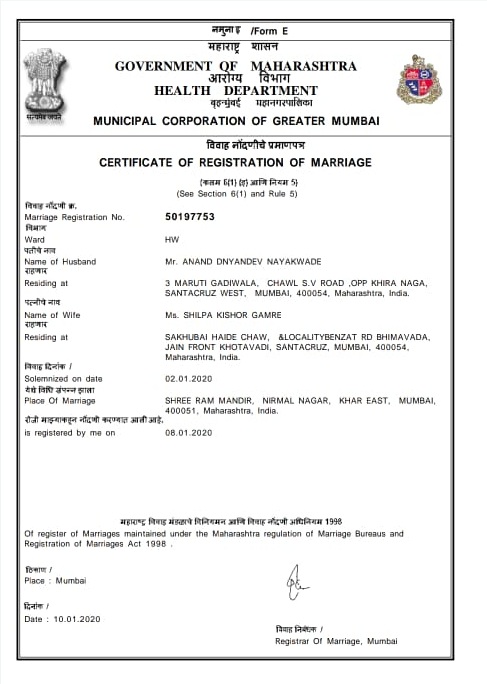
Marriage is one of India’s most important and sacred institutions, where it is considered a union of two souls for eternity. It is a bond that unites two individuals and two families, and various laws in India govern it. The two most important laws that govern marriage in India are the Hindu Marriage Act and the Special Marriage Act.
The Hindu Marriage Act was enacted in 1955 and applied to Hindus, Buddhists, Jains, and Sikhs. It recognizes marriage as a sacrament and lays down the ceremonies and rituals that must be performed for the marriage to be valid. The act also defines various aspects of marriage, such as the eligibility for marriage, the rights and obligations of the husband and wife, and the grounds for divorce.
The Special Marriage Act, on the other hand, was enacted in 1954 and applied to all religions. It provides for the solemnization of marriages between two unrelated individuals within the prohibited degrees of relationship. The act also recognizes marriage as a civil contract and allows two individuals to marry without religious ceremonies. The act also lays down the grounds for divorce and recognizes the equal rights and obligations of the husband and wife.
Despite the differences between the two acts, both laws aim to regulate and govern the institution of marriage in India.
In this blog post, we will delve into the differences between the Hindu Marriage Act and the Special Marriage Act, discussing the various aspects of both laws in detail. We will also explore the rights and obligations of the husband and wife under both laws and the grounds for divorce. By the end of this blog post, readers will have a comprehensive understanding of the differences between the Hindu Marriage Act and the Special Marriage Act and the implications of each law on marriages in India.
- Applicability
The Hindu Marriage Act applies to Hindus, Buddhists, Jains, and Sikhs. It recognizes marriage as a sacrament and is based on the customs and traditions of these religions. The Special Marriage Act, on the other hand, applies to all religions and recognizes marriage as a civil contract. It is based on the principles of secularism and provides a uniform law for all Indian citizens.
- Eligibility
Under the Hindu Marriage Act, a person must be a Hindu, Buddhist, Jain, or Sikh to be eligible to marry. In contrast, the Special Marriage Act allows two individuals not related to each other within the prohibited degrees of relationship to marry under the act, irrespective of their religion or caste.
- Ceremonies
The Hindu Marriage Act recognizes marriage as a sacrament and lays down the ceremonies and rituals that must be performed for the marriage to be valid. The act requires that the marriage be solemnized in the presence of fire and the recitation of Vedic mantras. However, the Special Marriage Act does not recognize any religious ceremonies, and the marriage can be solemnized without religious rites. The act only requires that the marriage be solemnized in the presence of a Marriage Officer and three witnesses.
- Registration
Under the Hindu Marriage Act, the marriage can be registered under the act. Marriage registration is not mandatory, but it is advisable to do so. On the other hand, under the Special Marriage Act, the marriage can only be solemnized after the parties have notified the Marriage Officer. The notice must be given one month before the date of marriage, and the marriage can only be solemnized after the expiry of this period.
- Grounds for Divorce
The grounds for divorce under the Hindu Marriage Act are cruelty, adultery, desertion, conversion, mental disorder, and venereal disease. In contrast, the grounds for divorce under the Special Marriage Act are similar to those under the Hindu Marriage Act, but it includes two additional grounds. The first is the failure to comply with a decree of restitution of conjugal rights, and the second is when one party has been sentenced to imprisonment for seven years or more.
- Rights and Obligations
Under the Hindu Marriage Act, the husband is considered the head of the household, and the wife is expected to obey him. The act also provides for the maintenance of the wife by the husband. In contrast, under the Special Marriage Act, the husband and wife are considered equal partners and have equal rights and obligations towards each other. Both acts provide for the division of property in case of divorce.
Conclusion:
In conclusion, the Hindu Marriage Act and the Special Marriage Act are two laws governing marriage in India. The Hindu Marriage Act recognizes marriage as a sacrament and applies to Hindus, Buddhists, Jains, and Sikhs. The Special Marriage Act, on the other hand, recognizes marriage as a civil contract and applies to all religions. The Hindu Marriage Act lays down the ceremonies and rituals that must be performed for the marriage to be valid. At the same time, the Special Marriage Act does not recognize any religious ceremonies. Both acts provide for the registration of marriages and lay down the grounds for divorce. The rights and obligations of the husband and wife differ under both acts, with the Hindu Marriage Act considering the husband as the head of the household. At the same time, the Special Marriage Act considers both partners equal.
Marriage Registration in Thane
Marriage Registration in Malabarhills
Marriage Registration in Cuffeparade
Marriage Registration in Juhu
Marriage Registration in Tardeo
Marriage Registration in Bandra West
Marriage Registration in Worli
Marriage Registration in Dadar
Marriage Registration in Byculla
Marriage Registration in Santacruz
Marriage Registration in Mahim
Marriage Registration in Vasai
Marriage Registration in Bandra East
Marriage Registration in Raigad
Marriage Registration in Andheri East
Marriage Registration in Ghatkopar
Marriage Registration in Bhandup
Marriage Registration in Mumbai Central
Marriage Registration in Kurla
Marriage Registration in Churchgate
Marriage Registration in lalbaugh
Marriage Registration in Navy Nagar
Marriage Registration in Dharavi
Marriage Registration in Nariman Point
Marriage Registration in Kalbadevi
Marriage Registration in Grant Road
Marriage Registration in Malad
Marriage Registration in Borivali
Marriage Registration in Dombivli
Marriage Registration in Palghar
Court Marriage Registration in Pune
Best Family Lawyer in Mumbai
Court Marriage Registration in Mumbai
Court Marriage Registratio in Thane
Court Marriage Registratioc in Pune
Court Marriage Registratio in Mumbai
Court Marriage Registratio in Nashik
Legal Service Provider in Mumbai, Thane, Pune
Marriage Registration in Mumbai
Court Marriage Registration in Mumbai



